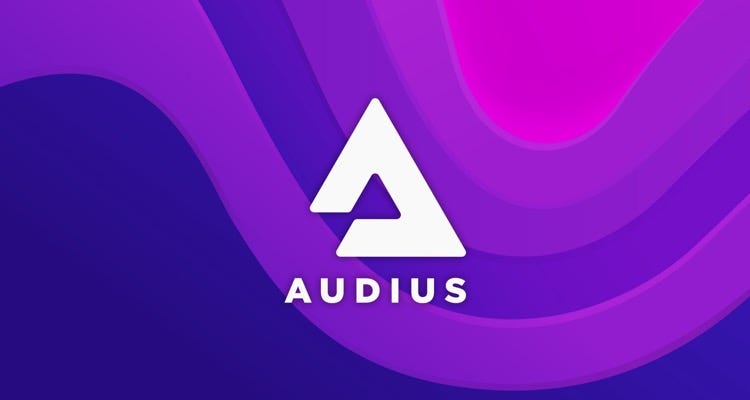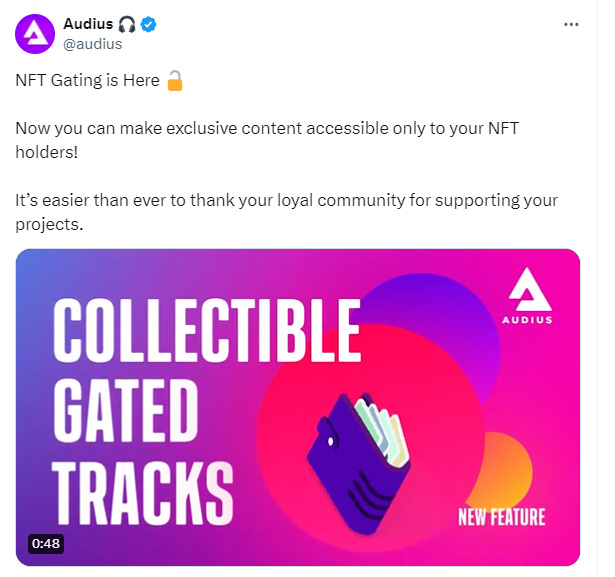- Blockletter
- Posts
- Exploring the Potential: Decentralization, Community-centricity, and AI Compatibility in the Future of Music
Exploring the Potential: Decentralization, Community-centricity, and AI Compatibility in the Future of Music
Unveiling the Future: How Audius Leads the Way in Music Innovation with Decentralization, AI Compatibility, and Community-Centricity, Redefining the Landscape for Artists and Fans Alike
In a recent interview with Cointelegraph, Audius, a blockchain-based music streaming platform, delved into its latest marketplace developments, AI implementations, and its music-centric approach to crypto and Web3.
Music, long regarded as a universal language bridging diverse cultures and backgrounds, has historically served as a conduit for introducing innovative ideas and technologies.

Throughout its evolution, the music industry has displayed a keen enthusiasm for embracing novel technologies to enhance creativity, streamline production processes, and broaden accessibility. Today, artists wield technological advancements that were inconceivable just a decade or two ago, enabling them to craft entire albums from the comfort of their bedrooms.
The emergence of Web3 tools such as blockchain technology, cryptocurrencies, and artificial intelligence (AI) has further underscored this trend, finding increasingly robust applications within the realm of music.
In recent times, artists have leveraged nonfungible tokens (NFTs) to release singles or curate exclusive experiences for their fanbase, while AI technologies have been harnessed to reimagine artistic expression and sonic landscapes. Concurrently, blockchain technology has begun to revolutionize music streaming services.
Since 2018, Audius—a decentralized platform for music streaming and monetization—has been deeply entrenched in the intersection of Web3 and music.
Having garnered attention from mainstream artists like Deadmau5 and Skrillex, Audius has emerged as a pivotal gateway for both artists and fans, facilitating their transition to the next wave of digital integrations.
In an exclusive discussion with Cointelegraph, Audius co-founders Roneil Rumburg and Forrest Browning shed light on how the future of music can seamlessly incorporate decentralization, community-centricity, and AI compatibility.
Paving the Path to Adoption
In contrast to the relatively niche appeal of the crypto and Web3 space, the world of music boasts a near-universal allure. Browning articulated this as the platform’s foundational strategy:
“Music serves as a powerful conduit to introduce the broader audience to the realm of crypto. Audius has been designed with a deliberate focus on appealing to the mainstream Web2 users, rather than catering solely to the specialized Web3 community. Our objective has always been to achieve mainstream adoption.”

This approach entails adopting an engineering and product perspective that conceals and simplifies the more complex facets of Web3, which may intimidate typical Web2 users unfamiliar with such concepts.
The platform provides users with the flexibility to determine their level of engagement with the essential Web3 features that underpin its operations.
“If users wish to delve deeper into the intricacies of wallet addresses, crypto transactions, or tipping mechanisms, they have the option to do so,” Browning explained.
“However, for those whose primary aim is to utilize Audius as a conventional Web2 streaming service, enjoying their favorite artists or purchasing tracks as avid fans, all the familiar mainstream functionalities are readily accessible. It is incumbent upon us to ensure a seamless user experience.”
While many developers within the Web3 community grapple with the challenge of attracting a broader user base beyond crypto enthusiasts, the intrinsic appeal of music facilitates this transition. Streaming music, uploading tracks, or engaging as a devoted fan seeking to acquire merchandise—these activities resonate with users, easing their transition into the realm of Web3.
“Users need not be aware that every action they take on the platform—whether favoriting a track, reposting content, or uploading a song—is recorded on the blockchain. Despite operating on fully decentralized infrastructure, both artists and fans can interact with the platform without necessarily delving into these technical intricacies,” Browning affirmed.
Fandom Over Speculation
In March 2023, Audius unveiled a groundbreaking feature known as NFT-gating, enabling its artists to grant exclusive access to certain songs, mixes, and track stems solely to fans who possess specific NFTs.

Interestingly, this introduction coincided with a period of significant stagnation in the NFT market.
Data from CoinGecko revealed a stark decline in NFT trading volume in 2023, plummeting by 50% from the previous year, from $26.3 billion to $11.8 billion.
When questioned about the divergence between NFT utility within the music industry and the broader trends in the NFT market, Rumburg offered insights:
“The speculative nature of NFTs is heavily influenced by market dynamics. However, the aspect of fandom remains impervious to such fluctuations. By prioritizing features that cater to fan engagement, we've managed to mitigate the impact of market cycles on our platform's usage.”
He emphasized the drawbacks associated with chasing speculative financial opportunities, noting that such pursuits tend to be cyclically driven, ultimately undermining sustained engagement. Audius, on the contrary, has steadfastly centered its efforts on serving the needs of artists and fans, rather than catering solely to speculative interests.
"While this approach may result in missed opportunities during market peaks, the engagement we foster is enduring and valuable," Rumburg asserted.
Browning echoed this sentiment, highlighting the evolution of the Audius community from a mere engagement platform to the vibrant marketplace envisioned from its inception.
Harnessing the Potential of AI
Amidst the burgeoning landscape of generative AI tools, the team at Audius has remained cognizant of the imperative to empower artists while fostering innovation within its decentralized community.
In a strategic move last May, the platform introduced a groundbreaking feature enabling artists to prominently display an "AI friendly" label on their profiles, signaling to their fan base their willingness to engage with AI-generated content.
Browning elucidated the rationale behind this initiative, emphasizing the platform's commitment to transparency and artist empowerment. "Whenever an Audius artist utilizes generative AI to create content, the original artist is automatically tagged. This fosters a rich social graph, clearly delineating the AI-generated works from the original artist's creations."
He underscored the platform's ethos of facilitating creative freedom while navigating the legal and ethical considerations surrounding AI-generated content. "Our approach is rooted in ensuring that artists and creators are empowered to make decisions aligned with their values and preferences," Browning affirmed.